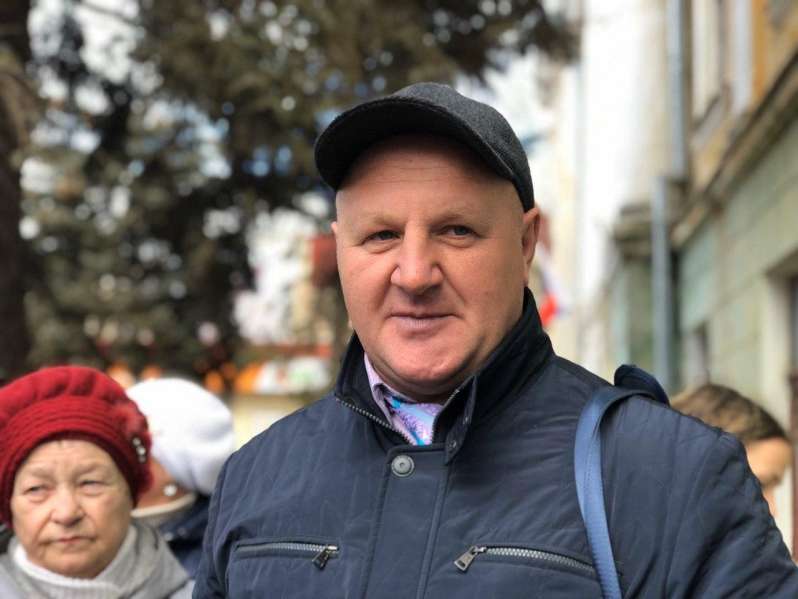• Topics / Human Rights Abuses in Russian-occupied Crimea
Russia seeks record sentence against Ukrainian Jehovah’s Witness in occupied Crimea

Russia has marked the sixth anniversary of its invasion of Crimea by proposing to sentence Ukrainian Jehovah’s Witness, Serhiy Filatov, to seven years in a maximum security prison for supposedly “undermining state security” by practising his faith. Any application of Russian legislation in occupied Crimea is in grave breach of international law, but Russia’s persecution of believers is even in violation of its own constitution. If the sentence were indeed to be passed in full, it would be the first imprisonment of a Jehovah’s Witness in Crimea and also the harshest sentence passed since 20 April 2017 when the Russian Supreme Court returned Russia to the worst days of the Soviet regime by banning the Jehovah’s Witnesses as ‘extremist’.
Although Russia hides behind words like ‘extremism’, Jehovah’s Witnesses are being put on trial in occupied Crimea or Russia merely for engaging in the activities that for any believers are part of their faith. It was therefore cheering to see a large number of people waiting outside the Russian-control Dzhankoy District Court to show their support for Filatov.
Prosecutor’ S.V. Bulgakov’s demand for such a harsh sentence on 25 February came as a shock, and does not even make sense since Bulgakov had just stated that there were extenuating circumstances – the fact that 48-year-old Filatov does not have a criminal record, and that two of his four children are minors.
Filatov called the demanded sentence lawlessness, and stressed that he was on trial for his beliefs, for the fact that he believes in God. “There are no elements of a crime, no guilt. It’s all trumped up and anybody standing here could also become a victim. They are returning to 1951, to 1937 as it was in Russia”, Filatov told Krym.Realii.
Oleh Zakharchuk, Filatov’s lawyer pointed to falsification of the evidence in this case from the very beginning. They will continue to seek justice, he promises, if necessary, at the European Court of Human Rights.
It is disturbing that this trial was held behind closed doors, which, Zakharchuk says, was on the application of the prosecution. There seem no good grounds for secrecy, yet the application was allowed by ‘judge’ Maria Yermakova.
Filatov was arrested after a ‘mass operation’ against believers during the night from 15-16 November 2018 when a large number of homes in Dzhankoy were subjected to armed searches. The Russian propaganda media presented these searches, during which a 78-year-old believer was manhandled, as being about breaking up an “extremist cell”, with the report typically, if absurdly, also suggesting that there might also be links with the Ukrainian Security Service.
On this occasion, only Filatov was charged under Article 282.2 § 1 of Russia’s criminal code which punishes for something termed ‘organization of the activities of an extremist organization.” He was released under a signed undertaking not to leave Dzhankoy, but was soon added to Russia’s notorious ‘list of extremists and terrorists’ which imposes economic restrictions without even a conviction.
The ‘case’ was passed to the Dzhankoy District Court under occupation in August 2019. The indictment claims that Filatov “undermined the foundations of the constitutional order and the security of the state”, by being the leader of a religious organization.
The main ‘prosecution witness’ was Vladislav Stradetsky, an FSB officer who, almost certainly under false pretences, attended and recorded a meeting in which Filatov and others spoke on religious subjects.
There was one other witness, a village school teacher who on 25 September 2019 told the court that he had stopped attending meetings after the Russian Supreme Court had banned the Jehovah’s Witnesses on 20 April 2017, and that he could not say anything about Filatov’s behaviour after that time. This individual changed his testimony on 12 November 2019 and instead claimed that he had attended meetings until November 2017 and had seen Filatov at them. He also asserted that there had been attempts by the accused to put pressure on him. It was after this that the court hearings were held in closed session, despite three applications from the defence to make them open. Judging by other cases in occupied Crimea, it is quite possible that the pressure on this witness came, in fact, from the FSB, possibly in the form of threats that he could himself face prosecution if he did not provide the required testimony.
The prosecution’s ‘specialists’ included an Orthodox priest from a Moscow Patriarchate church.
Among the witnesses for the defence was a woman who explained that her grandparents had been exiled to Siberia in Soviet times for their faith.
Filatov is due to give his final address to the ‘court’ on 28 February, after which a date for the sentence will be given.
As reported, at least one other Jehovah’s Witness from Yalta, Artem Gerasimov, is currently facing a long sentence (details here).





